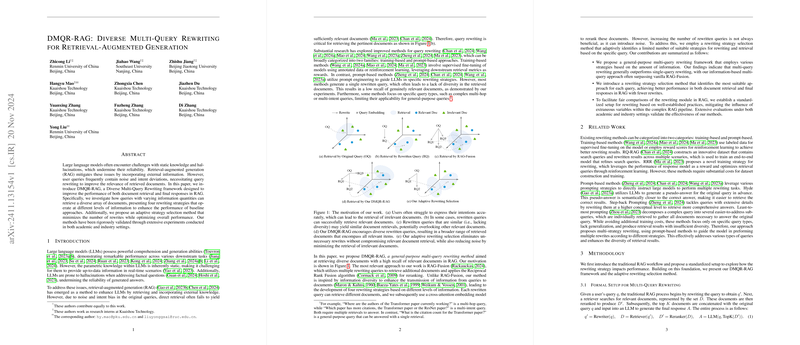An Expert Overview of "DMQR-RAG: Diverse Multi-Query Rewriting for Retrieval-Augmented Generation"
The paper addresses the persistent challenges in LLMs, notably their static knowledge base and tendency toward factual hallucinations, by proposing an innovative method of Diverse Multi-Query Rewriting in the context of Retrieval-Augmented Generation (RAG). These complications often degrade the reliability of LLMs, posing significant obstacles in handling real-time information retrieval and factually accurate question-answering tasks.
Problem Statement and Proposed Solution
LLMs, while robust in natural language understanding and generation, inherently face difficulty in adapting to dynamic knowledge updates and maintaining factual accuracy. Retrieval-Augmented Generation (RAG) has proven beneficial by incorporating external knowledge to mitigate these limitations. However, the efficacy of RAG heavily relies on the quality of initial queries, which are often noisy or misaligned with user intent.
To enhance the relevance of retrieved documents, this paper introduces the DMQR-RAG framework, which employs multiple query rewriting strategies to generate diverse document retrievals. This diverse rewriting endeavor aims to increase the chances of retrieving more relevant information by mitigatively addressing noise and intent deviations in user queries.
Methodology
The core contribution of DMQR-RAG is its novel approach of generating multiple rewritten queries from a single query to improve retrieval outcomes. The paper outlines four distinct rewriting strategies that offer varying informational perspectives:
- General Query Rewriting (GQR): Aims at refining the query to eliminate noise while preserving essential content.
- Keyword Rewriting (KWR): Focuses on extracting key elements from the query, facilitating optimized retrieval by search engines.
- Pseudo-Answer Rewriting (PAR): Generates a hypothesized response to enrich the query's informational content, overcoming hallucination and recall limitations.
- Core Content Extraction (CCE): Condenses the query to its fundamental components to avoid overwhelming retrievers with too much detail.
Alongside these strategies, the authors propose an adaptive strategy selection mechanism. This feature dynamically determines the most effective rewriting strategies to employ based on each query's characteristics, thereby reducing unnecessary rewrites and enhancing overall retrieval performance.
Experimental Validation
The paper conducts extensive experimentation using various datasets, such as AmbigNQ, HotpotQA, and FreshQA, benchmarked against both academic and industrial metrics. The results revealed that DMQR-RAG significantly outperforms traditional single-query rewriting methods, including state-of-the-art multi-query approaches like RAG-Fusion. Metrics such as Top-5 hit rate and precision for document retrieval, alongside standard accuracy and relevance measures for final responses, exhibit marked improvements. The adaptive selection method further demonstrates superior efficiency by reducing the average number of rewrites needed without sacrificing retrieval quality.
Analysis and Implications
The DMQR-RAG methodology suggests substantial implications for the field of AI-driven information retrieval. By enhancing document diversity and accuracy, it offers a scalable solution for businesses relying on LLMs for real-time, factually accurate response generation. In practical terms, the adoption of DMQR-RAG in industrial environments, as evidenced by real-world user query datasets, indicates promising avenues for reducing hallucination rates in LLM outputs.
The paper acknowledges the diverse nature of user queries encountered in industry, promoting an adaptive approach to query rewriting as a necessity for general application across various LLMs. Future research could potentially explore additional adaptive mechanisms or integrate these strategies with emerging information retrieval systems, broadening their applicability and increasing LLM reliability.
Conclusion
This work provides a sophisticated and methodologically sound approach to overcoming significant limitations in the retrieval capabilities of LLMs. The DMQR-RAG framework not only advances the state of RAG systems in terms of efficiency and accuracy but also sets a foundational approach for future research directed at optimizing the dynamic interaction between users' informational needs and machine comprehension abilities. By fostering a more nuanced understanding and refinement of input queries, this research underscores the critical role of diverse, adaptive methodologies in enhancing the performance of AI-driven retrieval systems.
